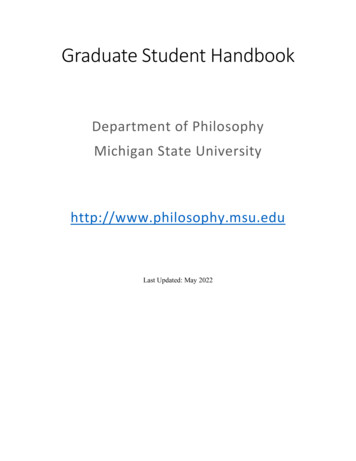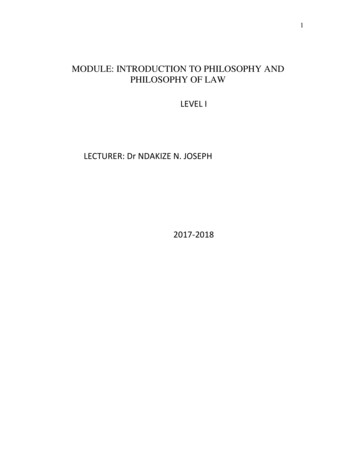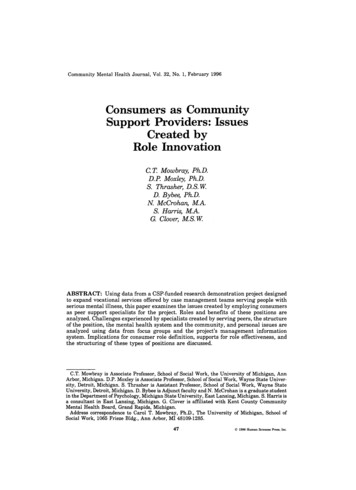
Transcription
Graduate Student HandbookDepartment of PhilosophyMichigan State Universityhttp://www.philosophy.msu.eduLast Updated: May 2022
Table of Contents1. Department Overview .51.1. Preamble .51.2. The Department .51.3. The PhD Program .61.3.1. Interdisciplinary Study .61.3.2. Goals of the Graduate Program .71.3.3. Achieving the Goals.81.4. General University policies.92. The MA Program .102.1. The MA Option .102.2. The Requirements for the Master of Arts Degree .112.2.1. Students in the masters program may elect to follow Plan A or Plan B .112.2.2. The public presentation or defense .132.2.3. The departmental logic requirement .132.3. Completing and graduating (for dual degree students) .132.3.1. Time limit .142.4. Making Satisfactory Progress Toward the Degree .142.5. Advising .152.6. Student files and records .152.6.1. Academic portfolio .152.6.2. Evaluations file .162.6.3. Teaching file and teaching portfolio .162.6.4. Personnel file .163. The Doctoral Program .163.1. Admission to the Ph.D. program .173.1.2. Procedures for MSU master’s students .173.2. The Requirements for the Ph.D. degree.173.2.1. The Comprehensive Examination .193.2.2. The Dissertation Prospectus or Topic Statement.193.2.3. The Dissertation.193.2.4. The Dissertation Defense .192
3.2.5. The departmental logic requirement .203.2.6. The foreign language requirement .203.2.7. Teaching portfolio .203.3. Completing and graduating .213.3.1. Time limits .213.4. Making satisfactory progress toward the degree .213.4.1. Criteria .213.4.2. Ph.D. Milestones.223.4.3. Monitoring progress.223.4.4. Determination of unsatisfactory progress .223.4.5. Continuing in the program beyond the coursework phase .233.5. Advising and mentoring.233.5.1. Forming the guidance committee .233.5.2. Membership of the guidance committee .243.5.3. Responsibilities of the guidance committee .253.5.4. Mentoring .263.6. Placement .303.7. Student files and records .313.7.1. Academic portfolio .313.7.2. Evaluations file .313.7.3. Teaching file and teaching portfolio .313.7.4. Personnel file .324. Academic Performance and Evaluation .324.1. Evaluations .324.2. Satisfactory progress toward the degree .334.3. Summation of criteria for being ineligible for financial aid .334.4. Summation of conditions for dismissals due to academic deficiencies.334.5. Appeal .335. Graduate Students as Graduate Assistants.345.1. General conditions .345.2. Eligibility for assistantships assigned by the philosophy department .345.3. Teaching assistant training.343
5.4. Assignment of assistantships .345.5. Evaluations of teaching.355.6. Work loads .365.7. Compensation and benefits .365.8. Summer teaching assignments .375.9. Leaves .375.10. Grievances .386. Professional Development and Department Life .386.1. Professional development .386.2. Participation in department affairs .387. Student Conduct and Conflict Resolution .397.1. General policies .397.2. Amorous or sexual relationships across responsibility axes .397.3. Grievance and conflict resolution procedures .398. Philosophy Departmental Process for Addressing Graduate Student Climate Concerns andReports .419. Integrity in Research and Creative Activity .429.1. Plagiarism .429.2. Responsible Conduct of Research (RCR) .4310. Publications to Consult .4411. Appendices.4511.1. Appendix 1: Philosophy Department Governance Structure .4511.1.1 Standing Committees .4511.1.2. Graduate students appoint from among themselves .4611.2. Appendix 2: Comprehensive Examination Process Overview .4611.2.1. Prelude to the process .4611.2.2. Calendar .4611.2.3. Topics addressed during the process .4711.3. Appendix 3: Written Comprehensive Examination Guidelines .4811.3.1. Aims of the examination .4811.3.2. When .4911.3.3. What .4911.3.4. Evaluation.504
11.3.5. Consultation and Assistance with writing the examination .5011.3.6. Outcomes of the examination .5111.3.7. Committee meetings after the comps.5211.3.8. Enrollment .5211.3.9. Conflict resolution .5211.4. Appendix 4: Dissertation Prospectus or Topic Statement Guidelines.5211.5. Appendix 5: Job Application Dossier Policies and Procedures .541. Department Overview1.1. PreambleMSU Philosophy aspires to be a pluralist department that supports a wide range of approaches todoing philosophy. As a department, we pursue this work through attention to our core values:accountability, responsibility and respect. By pursuing these values, we commit to taking theactions necessary to develop a departmental culture that sustains safety, inclusivity, and equity.These actions include self-reflection, open conversation, and focused workshops. AccountabilityWe will hold each other accountable as we engage in the ongoing process of building asafe, supportive, and trusting environment, which includes transparency about theprocesses that govern the department and the bases for important decisions. ResponsibilityWe consider it our individual and collective responsibility to be caring and supportivecolleagues to all members of department and to engage ethically with the broadercommunities with which we work. RespectOur departmental culture is grounded in a pervasive mutual respect for each other and thework that we do, as reflected in our willingness to listen to diverse perspectives oncomplex issues and to learn from each other.1.2. The DepartmentThe Philosophy Department’s strong orientation to a rich range of disciplinary areas incombination with particular strengths in bioethics, social and political philosophy, environmentalphilosophy, socially engaged philosophy of science (SEPOS), and cross-college interdisciplinaryconnections makes this one of the most distinctive and most interesting philosophy departmentsin the country, one in which scholars with solid disciplinary knowledge and training makecontributions to the discipline and address pressing public issues.5
The philosophy department faculty as a whole engages in research and scholarship over much ofthe traditionally emphasized periods, problems, key figures, and schools of thought that aretypically researched and taught in philosophy departments at comparable Association ofAmerican Universities (AAU) and Committee on Institutional Cooperation (CIC) institutions.The sub-disciplines of the history of philosophy, metaphysics and epistemology, philosophy ofscience, logic, philosophy of language, value theory, and continental philosophy are wellrepresented. Dissertations in many areas can be pursued.Faculty support graduate work in various ways (including graduate seminars, independentstudies, research assistantships, and mentoring) and serve on students’ doctoral guidancecommittees. The graduate student population varies from year to year, but it is generally around15-20.The philosophy department is housed in The College of Arts and Letters. In this handbook, theterms ‘the college’ or ‘college’ reference The College of Arts and Letters unless otherwiseindicated.1.3. The PhD ProgramThe Department of Philosophy offers a Ph.D. program which is a 5-year program designed forstudents entering with a B.A. with a major in philosophy or an M.A. in philosophy. Students maypursue a Master’s degree only as part of the pursuit of the Ph.D. or as part of the pursuit ofanother graduate degree at MSU (for further information see section 2.1./“The MA Option”).The Ph.D. requires students to complete broad distribution requirements that provide candidateswith a solid grounding in a range of areas within the discipline. The transition from courseworkto Ph.D. thesis work is accomplished through the comps process, which is tailored to the interestsof the students by the guidance committee. Once focused on their dissertation thesis, candidatesmay specialize in areas supported by the department.The Department has developed supports for students interested in working at the intersection ofthe disciplinary mainstream, practical engagement of philosophy, and practice-driven theory. Tosupport these goals, competitive fellowships are available that enhance either the theoretical orthe practical side of philosophy (check ing/)1.3.1. Interdisciplinary StudyWe encourage doctoral students to take a limited number of courses outside the department aspart of their Ph.D. program. The doctoral program includes the option of an interdisciplinaryminor field where up to six credits in other departments can be counted toward the courseworkcredit requirement. The department also welcomes graduate students from other departments inthe graduate seminars offered in the department. This interdisciplinary mixing in coursesprovides enriched learning environments for all students.6
Graduate Students can participate in several interdisciplinary graduate grams) and graduate ms/Programs.aspx?PType SPCG), such as Chicano/Latino Studies Program Ecology, Evolutionary Biology and Behavior (EEB) Gender, Justice, and Environmental Change Environmental Science and Policy Program (ESB) Interdepartmental Graduate Specialization in Cognitive ScienceCompleting an interdisciplinary graduate specialization typically requires the student to takecredits in other departments, over and above the credit requirement for the philosophy M.A. orPh.D. Requirements vary by program.The Department strives to work with new institutes and centers as they develop at MSU andfacilitate work with other centers and departments as students’ interests develop.1.3.2. Goals of the Graduate ProgramThe academic programs and other department activities are designed to educate and preparestudents to work as professional philosophers and teachers of philosophy at the college anduniversity level and, as appropriate to their ambitions, in other professional venues related totheir disciplinary or interdisciplinary specializations. Students are expected to be developing, to aprofessional level, the following capacities and competences: To read philosophical texts both canonical and current, closely and accurately, withmastery of distinctive terminology and recognizing distinctive kinds of argumentation; To discern and articulate philosophical issues and questions that arise in or are pertinentto those texts; To engage skillfully in philosophical conversation, comment, and critique; To make a substantial contribution of their own to the discourses within the discipline(and as appropriate to the student’s interests, across disciplines) both within the student’sarea of specialization and over a range both historical and topical that is considerablywider than that area; To write philosophical essays that clearly articulate views, positions and arguments in theliterature and clearly articulate the author’s own views, positions and arguments;effectively to present philosophical positions, doctrines and arguments orally; To craft syllabi and present philosophical ideas and arguments to students of philosophyand other non-professional audiences in ways that successfully inform, engage andcultivate philosophical skills; To craft and develop effective online classes that are based on current technologies andonline pedagogies. Workshops for developing skills in these areas are usually offered bythe college and Graduate School;7
To work effectively in academic and professional settings as colleagues and as membersboth of the intellectual community and the institutional unit (department, program,college, etc.).When graduate student work and progress are evaluated by faculty members, it is with respect tothese capacities and competencies and the progress in developing them, that the judgments are tobe made. 1.3.3. Achieving the GoalsGraduate students develop the skills and capacities of professional philosophers by activeengagement in six domains: Philosophy courses and seminarso The courses and seminars are offered routinely in the fall and spring semesters.Course descriptions are published in advance of the opening of the enrollmentperiod for each semester. Colloquia and other presentations such as faculty works-in-progress, dissertationdefenses, talks by candidates for faculty positions, and the graduate students’ speakerserieso Colloquia and other presentations of philosophical work usually take place onFriday afternoons between 3 and 5 p.m., and are advertised on bulletin boards andby e-mail in the department. Graduate students should bracket this time in theirown schedules and expect to attend events or meetings on many Fridays duringfall and spring semesters. Ad hoc discussions and informal study or reading groupso Informal discussions or reading groups are formed by anyone in the departmentwho wishes to form them; graduate students should take the initiative to creategroups that will engage them and promote their own interests. Teaching philosophy courses, as an assistant or instructoro The doctoral program includes a required seminar in teaching philosophy, and thedevelopment of a teaching portfolio; all doctoral students are given someopportunity for mentored teaching experience at some time during their programs(see section 3.5.4.). From time to time there are meetings or workshops to discussteaching issues, often initiated by teaching assistants. Teaching assistants shouldbe alert to their own needs for such workshops or discussions and initiate them asappropriate.o Students entering their first semester of teaching at MSU are required to attendthe university’s teaching assistant orientation. PHL 801, a seminar in teachingphilosophy, is a required element of the doctoral program.o Students’ development of a teaching portfolio is a requirement of the doctoralprogram. The teaching portfolio should be developed with the teaching mentor(see section 3.5.4) Departmental planning and governanceo There are voting graduate student representatives on the department’s Committeeof the Whole, Advisory Policy Committee, Graduate Committee and Academic8
Environment Committee; the representatives are elected by the graduate studentsin a process of their own devising. Philosophy department graduate students arealso eligible to serve as graduate student representatives on the College GraduateCommittee (College of Arts and Letters) and on the University GraduateCommittee (The Graduate School). The latter are appointed by the Council ofGraduate Students. (See Appendix I for a sketch of relevant governance structuresand committees.)o The department encourages students to be engaged in the Graduate StudentEmployment Union (https://geuatmsu.org/)Informal social interaction and conversation with faculty and among graduate studentso There are opportunities for informal conversations at seminar meetings and atmost department events such as colloquia and other presentations of papers ortalks. After colloquia there usually is a reception, to which graduate students arealways welcome. The new graduate student orientation generally includes adepartment social event and there is an annual fall department party. Manyfaculty members and many graduate students are in their offices a good deal ofthe time and generally can be engaged (as their time allows) for any interestingphilosophical conversation. Graduate students should take advantage of theseopportunities to enrich their pre-professional experience.Modest support for travel expenses for presenting at conferences is available through thecollege and the graduate school. An overview of funding and awards can be found d-funding/Students should be active at least to some degree in all six of these areas of opportunity forengagement and development of intellectual and collegial experience.1.4. General University policiesAcademic Programs CatalogAnti-Discrimination Policy (ADP)Code of Teaching ResponsibilityDisability and Reasonable Accommodation PolicyGeneral Student RegulationsGraduate Students Rights and Responsibilities (GSRR)Guidelines for Integrity in Research and Creative ActivitiesIntegrity of Scholarship & GradesLaw Student Rights and Responsibilities (LSRR)Medical Student Rights and Responsibilities (MSRR)MSU Guidelines for Graduate Student Mentoring and AdvisingMSU-GEU ContractPolicy on Relationship Violence and Sexual Misconduct9
2. The MA Program2.1. The MA OptionThe department no longer admits students to its MA program. Students who enter the graduateprogram with a BA in Philosophy are admitted directly into the PhD program.There are three exceptions:[1] PhD students can decide to get an MA as part of their degree pursuit in order to makethemselves eligible for additional professionalization opportunities, such as certain teachingpositions outside the university or for higher pay within MSU. Such students need to a) meet thevarious requirements for the MA degree and b) inform their guidance committee chair and theAssociate Chair at the beginning of the semester during which the MA degree is pursued abouttheir intentions to get the MA degree. MA candidates will then in Campus Solutions andGradPlan temporarily be placed in the (former) MA program track.[2] PhD students who choose to leave the program before obtaining their PhD may apply for anMA degree instead. Such students also need a) meet the various requirements for the MA degreeand b) inform their guidance committee chair and the Associate Chair of their intentions at thebeginning of the semester during which the MA degree is pursued.[3] Students who are funded in an MA or PhD program other than philosophy at MSU may beadmitted to the MA track as dual degree students. Such students must be receiving funding fromanother program, as the Philosophy Department does not admit unfunded students and does notfund MA students itself. Students who want to pursue this option do not need to meet the officialapplication deadline and are required to submit: a personal statement an academic statement a writing sample proof of being admitted to another MSU program proof that they are funded for the period of the MA which is usually two years.More details can be found here: https://philosophy.msu.edu/admissions/The minimal admission requirements for dual degree students are: The Bachelor’s degree or its equivalent; A grade point average of at least 3.0 for the last two years of undergraduate work; At least 15 semester credits in philosophy (this requirement may be waived forapplicants with outstanding records in other disciplines); For international students, a minimum of 273 on the TOEFL exam.10
2.2. The Requirements for the Master of Arts Degree2.2.1. Students in the masters program may elect to follow Plan A or Plan BTable 1: Plan A and Plan BPlan A (Thesis)30 semester credits in PHL courses at the400-level or higher*Covering 4 areas Logic and Philosophy of Science Metaphysics and Epistemology Value Theory History of PhilosophyMinimum of 16 credits at the 800-levelincluding PHL 800 and Minimum of 3 seminars Minimum of 3 courses in the thesisarea, approved by the Associate Chair 4-8 credits of PHL 899 (thesisresearch)Maximum of 8 credits of PHL 890(independent study)Complete an acceptable thesis and defend inpublic oral examinationMeet the department logic requirementFulfill general university and collegerequirements for the M.A. degree**Plan B (Paper)30 semester credits in PHL courses at the 400level or higher*Covering 4 areas Logic and Philosophy of Science Metaphysics and Epistemology Value Theory History of PhilosophyMinimum of 16 credits at the 800-levelincluding PHL 800 and Minimum of 3 seminars Minimum of 3 courses in the thesisarea, approved by the Associate ChairMaximum of 8 credits of PHL 890(independent study). PHL 899 credits do notcount toward the 30 credits for the Plan Bmaster’sComplete a philosophy paper worthy ofpublic presentation and present itMeet the department logic requirementFulfill general university and collegerequirements for the M.A. degree***Transfer of credit: A maximum of 9 semester credits in graduate level courses and in which atleast a 3.0 was earned may be transferred from other accredited graduate programs. To transfercredits the student should petition the Associate Chair of the department, providing full details ofthe credits in question, including an account of the material covered in the courses, texts used,etc. Normally, the Associate Chair will recommend to the department that the credits betransferred only when the course work in question appears comparable to work taken by graduatestudents in this department. No credits that counted toward a student’s undergraduate degree canbe transferred for graduate credit.**Residence: The university requires that a minimum of nine credits for the M.A. degree betaken on campus. In practice, however, master’s candidates in philosophy should expect to takeall 30 required credits (except transfer credits) on campus.Things that do not count toward the 30 credits: Foreign language courses Credits taken to fulfill the logic requirement Non-PHL courses11
Credits for courses or seminars for which the student has earned a grade of less than 3.02.2.1.1. The master’s thesisA master’s thesis is more synoptic than a usual seminar
the traditionally emphasized periods, problems, key figures, and schools of thought that are typically researched and taught in philosophy departments at comparable Association of . The sub-disciplines of the history of philosophy, metaphysics and epistemology, philosophy of science, logic, philosophy of language, value theory, and .










